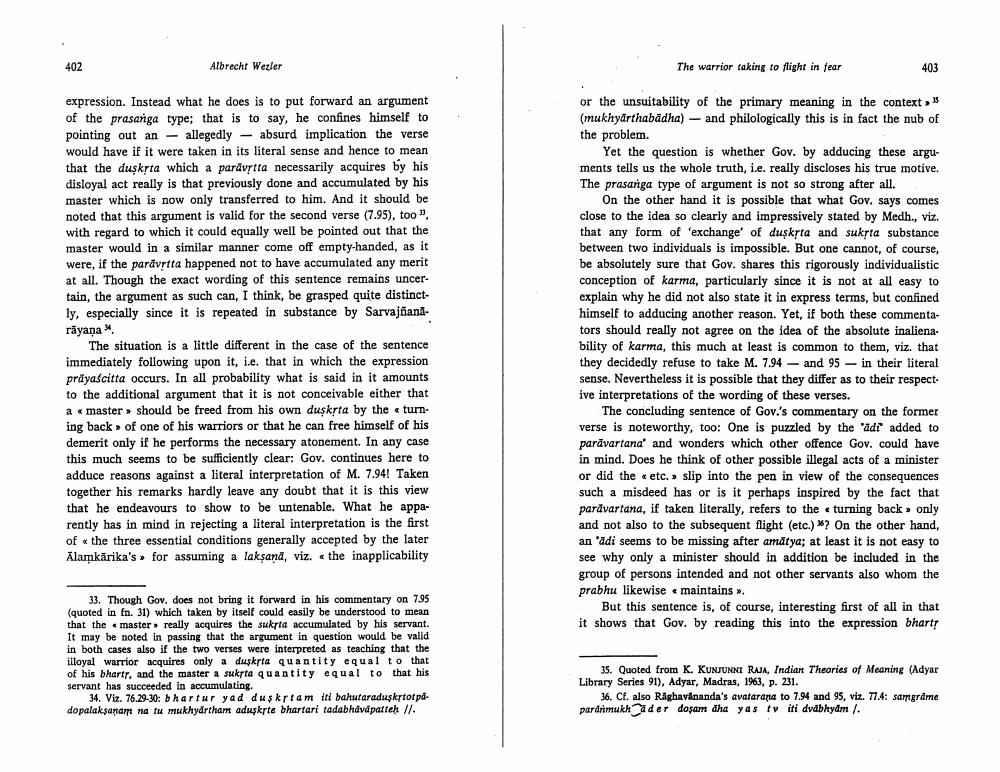________________
402
Albrecht Wezler
The warrior taking to flight in fear
403
expression. Instead what he does is to put forward an argument of the prasanga type; that is to say, he confines himself to pointing out an allegedly - absurd implication the verse would have if it were taken in its literal sense and hence to mean that the duşksta which a parávitta necessarily acquires by his disloyal act really is that previously done and accumulated by his master which is now only transferred to him. And it should be noted that this argument is valid for the second verse (7.95), too". with regard to which it could equally well be pointed out that the master would in a similar manner come off empty-handed, as it were, if the pardvyfta happened not to have accumulated any merit at all. Though the exact wording of this sentence remains uncertain, the argument as such can, I think, be grasped quite distinctly, especially since it is repeated in substance by Sarvajñandrāyana
The situation is a little different in the case of the sentence immediately following upon it, i.e. that in which the expression prayascitta occurs. In all probability what is said in it amounts to the additional argument that it is not conceivable either that a « master should be freed from his own duskria by the turning back of one of his warriors or that he can free himself of his demerit only if he performs the necessary atonement. In any case this much seems to be sufficiently clear: Gov. continues here to adduce reasons against a literal interpretation of M. 7.941 Taken together his remarks hardly leave any doubt that it is this view that he endeavours to show to be untenable. What he apparently has in mind in rejecting a literal interpretation is the first of the three essential conditions generally accepted by the later Alamkārika's for assuming a laksanā, viz. the inapplicability
or the unsuitability of the primary meaning in the context, (mukhyārthabädha) - and philologically this is in fact the nub of the problem.
Yet the question is whether Gov. by adducing these arguments tells us the whole truth, i.e. really discloses his true motive. The prasanga type of argument is not so strong after all.
On the other hand it is possible that what Gov. says comes close to the idea so clearly and impressively stated by Medh., viz. that any form of 'exchange of dusksta and suksta substance between two individuals is impossible. But one cannot, of course, be absolutely sure that Gov. shares this rigorously individualistic conception of karma, particularly since it is not at all easy to explain why he did not also state it in express terms, but confined himself to adducing another reason. Yet, if both these commentators should really not agree on the idea of the absolute inaliena. bility of karma, this much at least is common to them, viz. that they decidedly refuse to take M. 7.94 - and 95 - in their literal sense. Nevertheless it is possible that they differ as to their respect. ive interpretations of the wording of these verses.
The concluding sentence of Gov.'s commentary on the former verse is noteworthy, too: One is puzzled by the 'adi" added to pardvartana' and wonders which other offence Gov. could have in mind. Does he think of other possible illegal acts of a minister or did the «etc. slip into the pen in view of the consequences such a misdeed has or is it perhaps inspired by the fact that pardvartana, if taken literally, refers to the turning back only and not also to the subsequent flight (etc.) *? On the other hand, an adi seems to be missing after amātya: at least it is not easy to see why only a minister should in addition be included in the group of persons intended and not other servants also whom the prabhu likewise « maintains ».
But this sentence is, of course, interesting first of all in that it shows that Gov. by reading this into the expression bhart
33. Though Gov. does not bring it forward in his commentary on 7.95 (quoted in fn. 31) which taken by itself could easily be understood to mean that the master really acquires the sukta accumulated by his servant. It may be noted in passing that the argument in question would be valid in both cases also if the two verses were interpreted as teaching that the illoyal warrior acquires only a duskrta quantity equal to that of his bharts, and the master a suksta quantity equal to that his servant has succeeded in accumulating.
34. Viz. 76.29-30: bhartur yad du skrtam iti bahutaraduşkstot pa. dopalaksanart na tu mukhyartham aduskrte bhartari tadabhävdparten //.
35. Quoted from K. KUNJUNNI RAJA, Indian Theories of Meaning (Adyar Library Series 91), Adyar, Madras, 1963, p. 231.
36. Cf. also Raghavananda's avatarana to 7.94 and 95, viz. 77.4: sarigrame pardrimukhader doşam dha yas tv iti dvdbhydm.




